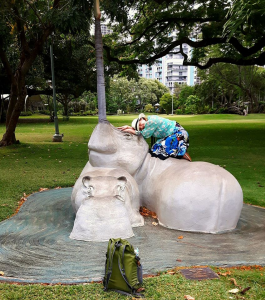13 enthusiasts signed up for a full day at Thompson Rivers University to share FLO experiences and hammer out ideas for ways to advance our work together. Our specific focus was on increasing adoption and inter-institutional sharing of FLO courses.
Why do we need to change what we're doing?
The original FLO Fundamentals course was developed at Royal Roads University as part of the BCcampus Online Program Development Fund (OPDF). In 2013 BCcampus began offering FLO and then developing courses to add to the “family”. Over the years we can count 37 offerings with 659 registrations representing 22 BC post-secondary institutions, and other institutions and organizations across Canada and the US. Participants consistently report that they are satisfied or very satisfied with their experiences.
So why are we encouraging adoption by other institutions instead of continuing to offer FLO through BCcampus? Feedback like this:
“It is an extremely useful resource and should be required learning for anyone wanting to teach or administer online learning.” FLO participant
As successful as this program has been, we are not reaching all the faculty who need this professional development. At the same time, we struggle to reach our registration quota to run the courses on a cost-recovery basis. It's a paradox! The solution points to increased involvement by post-secondary institutions across the system.
 |
| Leva Lee and Michelle Johnson busy with their visual interviews |
- developed a FLO Facilitation Guide
- continued to offer fee-based courses using a cost recovery model
- provided opportunities for FLO facilitator mentorship
- created a new offering: MicroCourses - one-week asynchronous emergent courses related to designing and facilitating learning online
- included FLO offerings in the Learning Access Program for Educators (LAP-E) to open up opportunities.
At that time we discussed phasing out the BCcampus offerings but identified the need to continue to mentor future FLO facilitators. To date 28 individuals have co-facilitated FLO courses hosted by BCcampus, of which 18 volunteered their time in exchange for mentorship. In addition, over 70 individuals, representing 21 institutions, have participated in the FLO Facilitator Development course so are ready to co-facilitate or mentor others to facilitate FLO courses.
That's a lot of FLO facilitators!
Why is FLO important?
“Inadequate training/pedagogical knowledge available for faculty in online learning was reported by 82% of the institutions in Western Canada, compared to 73% in the rest of the country. It should be noted that this comes from institutional leaders, which suggests there are systemic issues in providing this training, i.e. there are factors beyond the power of Provosts/Vice-Presidents Education that prevent better training for faculty.”
Some seriously impressive progress!
At the FLO gathering, following activities to become acquainted with one another and with the history and current status of FLO (along with howlin' coffee and excellent snacks!), we worked through a process of:
 |
| The beginning of our Fishbowl activity: The good, bad, ugly AND lovely! |
- hearing from those who are currently implementing or planning to adopt FLO courses in house – there is good, bad, ugly AND lovely!
- mapping out the current state of FLO courses and processes – anything we aren’t doing? Need to rethink or abandon?
- brainstorming ideas, actions, and recommendations, given our priority of adoption and inter-institutional sharing of FLO, and
- contemplating our individual involvement going forward
 |
| Using the Ecocycle to plot FLO courses and process |
 |
| Our remote enthusiasts we equally involved! |
Thanks to
Liberating Structures and excellent facilitation by Tracy Roberts and Leva Lee, we arrived our top 10 ideas for moving the FLO project forward, several of which BCcampus is already able to technically and strategically support:
1. Advertise in ONE place, all FLO offerings that are open to all (--> Look no further than the new TLPD Portal)
2. Upload developed courses (OERs) to a common hub
--> We do have SOL*R but need to revisit the issue
3. Establish a FLO champion at each institution to spread the word amongst faculty.
4. Pair up and co-facilitate with sister institutions.
--> Can we build on what already exists with ETUG reps?
5. Open shadowing opportunities: Anyone can join a FLO course in exchange for offering a service (promote, facilitate, develop content, etc)
6. Create a mailing list/discussion space for sharing of FLO ideas, stories, content, opportunities, etc
--> We've used the BCcampus Learning + Teaching Moodle site for this in a very small and casual way. Most if not all individuals already have accounts. Build on that or rethink our use of tools to support this important community work?
8. Invite/foster multi-institutional co-development of FLO courses.
9. Expand FLO considerably – international, different formats (self-paced), and preparation for teaching that isn’t socially-based academic courses.
10.Move toward FLO courses being a prerequisite for faculty planning to teach an online course.
Some of these ideas are bolder than others, no doubt! But we left the day feeling inspired to take FLO to the next level. We're confident that this next phase of the FLO project -- reduced offerings by BCcampus and increased involvement by BC post-secondary institutions -- will benefit yet more faculty and staff.
Let's do this!







